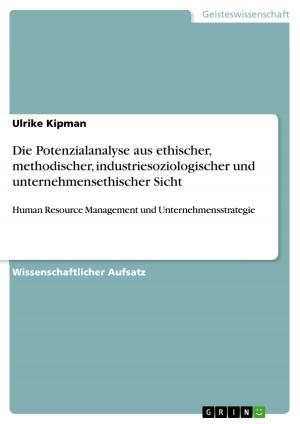How can the knowledge on clusters help to understand the phenomenon of innovation?
What are the management implications?
Business & Finance, Management & Leadership, Management| Author: | Stella Strüfing, Alissa Golomzina, Thomas Walter | ISBN: | 9783656391937 |
| Publisher: | GRIN Verlag | Publication: | March 15, 2013 |
| Imprint: | GRIN Verlag | Language: | English |
| Author: | Stella Strüfing, Alissa Golomzina, Thomas Walter |
| ISBN: | 9783656391937 |
| Publisher: | GRIN Verlag |
| Publication: | March 15, 2013 |
| Imprint: | GRIN Verlag |
| Language: | English |
Research Paper (undergraduate) from the year 2013 in the subject Business economics - Business Management, Corporate Governance, grade: 1,7, University of Twente (School of Management and Governance), course: Supply Chain Management and Innovation, language: English, abstract: Concentration of innovative companies in particular locations and the need to consider clusters in innovation management: In the current business environment it is remarkable that innovative companies are often concentrated in specific regions. This is true for many industries, however, the probable best known example for such a phenomenon where innovative firms settle close by another is the Silicon Valley. Nevertheless, this is not simply an agglomeration but due to network aspects taking place it is forming a cluster, coming along with several benefits. These benefits of clusters enhance the firm's productivity and the firm's innovation performance, and should therefore be considered in several decision-making processes such as the location choice, innovation output, access to labour and resources. Considering innovation benefits and their underlying mechanism is particularly important because the technological development cycles and time to market period are becoming increasingly shorter. Respecting the similarities, subsidiaries and interconnectedness inherent in clusters and using them to increase the innovative output to generate a competitive advantage over isolated firms is essential for staying at the top of the market. Understanding the location advantage cluster exhibit is therefore a competitive advantage that will affect a firm and their innovative output. This paper elaborate the influence of clusters on innovation by explaining clusters in general and in particular concerning innovation benefits and their underlying mechanism and showing how managers can possibly benefit from cluster innovative opportunities.
Research Paper (undergraduate) from the year 2013 in the subject Business economics - Business Management, Corporate Governance, grade: 1,7, University of Twente (School of Management and Governance), course: Supply Chain Management and Innovation, language: English, abstract: Concentration of innovative companies in particular locations and the need to consider clusters in innovation management: In the current business environment it is remarkable that innovative companies are often concentrated in specific regions. This is true for many industries, however, the probable best known example for such a phenomenon where innovative firms settle close by another is the Silicon Valley. Nevertheless, this is not simply an agglomeration but due to network aspects taking place it is forming a cluster, coming along with several benefits. These benefits of clusters enhance the firm's productivity and the firm's innovation performance, and should therefore be considered in several decision-making processes such as the location choice, innovation output, access to labour and resources. Considering innovation benefits and their underlying mechanism is particularly important because the technological development cycles and time to market period are becoming increasingly shorter. Respecting the similarities, subsidiaries and interconnectedness inherent in clusters and using them to increase the innovative output to generate a competitive advantage over isolated firms is essential for staying at the top of the market. Understanding the location advantage cluster exhibit is therefore a competitive advantage that will affect a firm and their innovative output. This paper elaborate the influence of clusters on innovation by explaining clusters in general and in particular concerning innovation benefits and their underlying mechanism and showing how managers can possibly benefit from cluster innovative opportunities.















